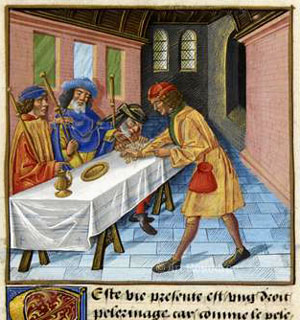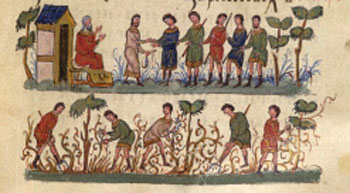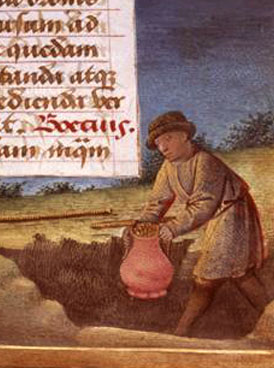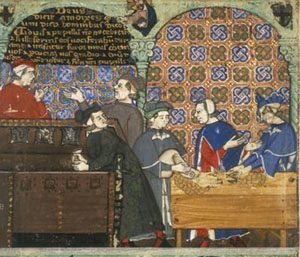 |
Socio-Political Issues
Socialism and Gnosis - Part III
Salaries and Investments Are Praised
in the Gospels
Cunha Alvarenga
In the previous articles (here and here), we saw how material goods can be – and actually are – a gift of God that should be used correctly by men according to the parables of the Gospel and Catholic doctrine. Today let us examine some consequences of the two rights we studied, the right of property and the right of inheritance.

Pilgrims pay their debts at a hostel
14th century illuminated manuscript |
One consequence of a man’s right of property is his liberty to freely contract workers. In other words, it is the legitimacy of the salary system. We don’t need to stress that progressivists, who sing in the same choir as the socialists and communists, consider this practice radically unjust, and strive to replace it with either the system of workers sharing the profits of the owners or that of co-management. Or they propose the yet more radical system of shared property.
In Catholic societies of the past the institution of the famulato (famulo = servant) was developed. Through it, wealthier families stably lent out land or other means of production to less favored families, who would receive a proportional measure of the profits for their subsistence. So we see that a proportionate participation in benefits – so long as it is part of a freely made contract – is not something new. In the past such cases were frequent in the many circumstances where capital and work harmonically united to meet the same end.
The salary system is legitimate
There is nothing unjust in the system of contracting for work through a previously agreed stipend. This is shown in the parable of the workers in the vineyard. Our Lord says: “The kingdom of heaven is like to an householder, who went out early in the morning to hire laborers into his vineyard. And having agreed with the laborers for a penny a day, he sent them into his vineyard.
“Then, going out about the third hour, he saw others standing in the marketplace idle. And he said to them: Go you also into my vineyard, and I will give you what shall be just. And again he went out about the sixth and the ninth hour, and did the same.

The parable of the workers in the vineyard |
“And about the eleventh hour he went out and found others standing, said to them: ‘Why stand you here all the day idle?’ They answered: ‘Because no man hath hired us.’ So he told them: ‘Go also into my vineyard.’
“And when evening came, the lord of the vineyard said to his steward: Call the laborers and pay them their hire, beginning from the last even to the first. So when those who came about the eleventh hour arrived to take their pay, each one received a penny. Now when the first also came, they thought that they should receive more. But each one also received a penny.
“Receiving it they murmured against the master of the house, saying: ‘These last have worked but one hour. and you have made them equal to us, who have borne the burden of the day and the heat.
“But he answered, saying to one of them: ‘Friend, I do you no wrong. Did you not agree with me for a penny? Take what is yours and go your way. I will also give to this last what I gave to you. Or, is it not lawful for me to do what I will? Is your eye evil because I am good?’” (Mat 20:1-15).
The presupposition of this parable is the just salary. Here participation in the profits is not presented as a right, but as a fruit of the liberality of the owner. This parable legitimates the system of contracting work. It also shows that the salary system existed at that time, and it is not a characteristic exclusive to Capitalism, as many leftists and progressivists pretend.
In passing it is interesting to stress that the supposed evolution of the means of production – from servitude to salary, and from salary to shared profits and properties - which forms the base of Marx’ theory, is also proved to be a lie. At the time of Our Lord, the same salary system we have today was being used. There is no evolution in the picture.
The Catholic use of money
Profit is another ax to grind for Progressivism, which always returns to the outdated Marx as the last model in economics. If it is true, as the Apostle teaches, that “those who want to become rich fall into the temptation and into the snare of the Devil,” because “the desire for money is the root of all evils” (1 Tim 6: 9, 10), it is obvious that this also applies to systems and not just individuals. Granted, it applies to the abuses of Capitalism or savage Capitalism, as it has been called. But it principally applies to Socialism and Communism, which are exclusively turned toward the material distribution of the goods of this world, paying no account to the life of the man’s soul.
Some form of currency has been used by every civilized people in History as an instrument of trade, acting as a common denominator for wealth. We should use money grounded on the moderation that St. Paul says should orient us in the use of earthly goods (1 Cor 7:31). But in itself there is nothing pernicious in money. The root of all evils lies not in the money, but in the unbridled love of money. In some periods in History, such as the Middle Ages, currency had a quite restricted role, since economic gains were made chiefly by other ways of profit, such as the renting of land.

The master chastised the servant who buried his one talent |
Certainly in our use of money, we also must pay attention to what Our Lord taught us about avarice and how we should use our riches. The use of money as a vehicle of exchange in economic activities, however, is perfectly licit. It is legitimated by the parable of the talents, where we are told that the kingdom of heaven “is like a man who, going into a far country, called his servants and delivered to them his goods. To one he gave five talents, to another two, and to yet another, one, to each according to his ability. And then he went on his journey.” (Mat 25: 14-30).
When the owner returned the one who had received five presented those five plus another five talents he had earned; the one who had received two talents had made another two. Both were praised and rewarded by their lord.
Then the third, who had received one talent, returned the same talent without any interest. He was reprehended by his lord as wicked and lazy. And the lord added, “You should have committed my money to the bankers, and on my return I would have received with interest what was mine.” And that useless servant was severely chastised.
The same theme is dealt with in the parable of the ten marks (Lk 19: 11-28).
This last parable shows us that Our Lord accepts as legitimate and normal:
- The profits and interests that come from investing one's capital;
- The right to give a higher remuneration to those more diligent and shrewd in dealing with money;
- The right to chastise those fearful or lazy in their obligation to make capital produce a profit.
Profit and interest are targets of the demagogues
The use of money as a means of exchange and accumulating riches is one of the favorite themes of progressivist and socialist demagogues. They condemn any economic activity that comes from free initiative. They present the farmer and the business owner as egotist men, and praise socialists as the only ones turned toward the public interest. They act as if the activities of the farmer and the industrialist could never serve the common good.

A scene in a medieval counting house |
Contrary to this demagogy, Our Lord treats the use of money, profit, and a proportional interest gained in the application of money as normal
In itself money is not fertile. But when applied to the acquisition of land, agricultural or industrial tools and machinery, transportation of merchandise, etc., it becomes fertile and productive.
Catholic moralists of the Middle Ages, even at a time where money played a restricted role, recognized some legitimate reasons for a money-lender to make an extra profit. Among them were the risk of possible loss, the absence of profit and the danger of chance circumstances. That is to say, “the money-lender can ask for an extra profit in a loan in those cases where he takes the risk of not having his money returned due to some misfortune, when he runs a serious danger of loss, or when he faces the probability of not receiving any benefit” (Fr. Joaquin Azpiazu, SJ, La Moral del Hombre de Negocios, Madrid: Razon y Fe, 1944, p. 109).
The Code of Canon Law [1917] also establishes this with regard to contracts involving temporal goods of the Church: “When someone gives a consumer good to another person in a contract that makes the latter the new owner, with the supposition that the latter will return that same good in the same amount at some later date, then it is not licit to receive any profit from this contract. However, when someone lends a consumer good, it is licit to stipulate an interest following the laws of the land - so long as it is not excessive - or even a higher interest insofar as it is just and proportionate” (Can. 1543). [emphasis added]
The true Church of Our Lord Jesus Christ was not born yesterday and will not end tomorrow. She was founded by Him many centuries ago and will remain until the end of time. She is the Ark of Salvation that floats over the tempestuous and turbulent waves of the apostasy of the modern world. In this general apostasy we see the agents of the Revolution attacking all the presuppositions of Natural Law that form the base for an organic economy.
This attack aims to destroy organic society and hierarchy because they are mirrors of God. The harmonic existence of organic structures and planned institutions, of social hierarchy and the little people, of spirit and matter is hated by the Revolution. It is a Gnostic and egalitarian Revolution that must be counter-attacked in all its manifestations by true Catholics.

Posted March 13, 2009
Translated from Catolicismo, June 1971

Related Topics of Interest
 Which Poverty Is Gnostic? Which Poverty Is Gnostic?
 Material Goods Are Glorified in the Parables Material Goods Are Glorified in the Parables
 Evangelical Poverty Is Not a Virtue for All Evangelical Poverty Is Not a Virtue for All
 Distributists Misleading Their Audience about Capitalism Distributists Misleading Their Audience about Capitalism
 A Distributist Manifesto Spiced with Communism A Distributist Manifesto Spiced with Communism
 St. Thomas against Distributism St. Thomas against Distributism
 Socialism and Distributism in Catholic Clothing Socialism and Distributism in Catholic Clothing
 Nazism: A Gnostic Sect Nazism: A Gnostic Sect
 TIA Is Neither Nazi nor Anti-Semitic TIA Is Neither Nazi nor Anti-Semitic
 Inequalities Are the Base and Bond of Society Inequalities Are the Base and Bond of Society

Related Works of Interest
|
|
Social-Political | Hot Topics | Home | Books | CDs | Search | Contact Us | Donate

© 2002- Tradition in Action, Inc. All Rights
Reserved
|
 |
|